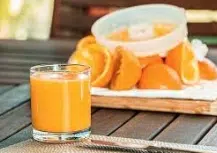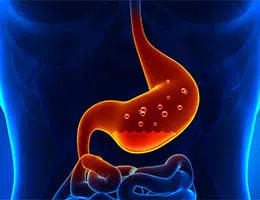 The term juice comes from the Latin word sucus . The concept refers to the liquid of plant or animal origin that is obtained by distillation , cooking or pressure .
The term juice comes from the Latin word sucus . The concept refers to the liquid of plant or animal origin that is obtained by distillation , cooking or pressure .
Juice is usually used as a synonym for juice , which is a fluid generated by squeezing or crushing a fruit, a flower or something similar . Juices or juices are very important in the diet.
Fruit juices , for example, are popular all over the world. These juices are extracted by pressing or blending a fruit , such as orange, grapefruit, grape, lemon or apple. Natural juices, squeezed from fresh fruit and without the addition of preservatives, have beneficial nutritional properties for the body.
Because of the difficulties involved in getting and squeezing fresh fruits every time you want to drink juice, it is common for people to turn to packaged fruit juices . In this case, the product goes through various processes and has additional substances that make it no longer so positive for health.
Vegetable juice is another healthy alternative, although less consumed than fruit juice. Carrot juice and beet juice are two of these options .
Gastric juice , on the other hand, is a combination of secretions from the gastric glands that is formed with sodium chloride, hydrochloric acid, water, potassium chloride, mucus, enzymes and bicarbonate. This fluid allows the bolus to be transformed into chyme , a paste whose ingredients are absorbed by the body and its waste is expelled.
In other words, we can define gastric juice as a combination of secretions from different specialized epithelial cells. Two other names it receives are gastric acid and, the most technical of the three, gastric secretion .
In fasting, gastric juice consists of a solution of sodium chloride with potassium and hydrogen in small quantities. Once we eat food, the hydrogen concentration increases to considerable levels and the sodium concentration decreases until around 2 liters of hydrogen chloride are produced with a pH whose minimum value is 1.
It is important to note that a pH value of 1 is three million times lower than that of blood. Chloride secretion takes place against the electrical gradient and against the concentration gradient. In this way, parietal cells have an ability to secrete acid that is linked to active transport.
 The secretion of gastric juice is the most important stage of digestion , since when the food encounters lytic enzymes and with a low pH it dissociates into collagen fibers and the phenomenon known as proteolysis also occurs, that is, the proteins present are denatured. At the same time that the stomach contracts and produces a mechanical action, the aforementioned constitutes the chemical action.
The secretion of gastric juice is the most important stage of digestion , since when the food encounters lytic enzymes and with a low pH it dissociates into collagen fibers and the phenomenon known as proteolysis also occurs, that is, the proteins present are denatured. At the same time that the stomach contracts and produces a mechanical action, the aforementioned constitutes the chemical action.
Mucus is a slippery, viscous gel that we find as a coating on the mucosal surfaces of the stomach and intestine. The gels called mucins, formed by glycoproteins, are what give it its characteristic features.
In gastric juice we find several enzymes, but the most important is pepsin, which can be defined as a heterogeneous group of proteins that has the function of denaturing proteins. Among the others, which have well-defined functions, gastric lipase also stands out, with great effectiveness against triglycerides with fatty acids whose chain is gelatinous and short.
In a symbolic sense, finally, what is useful or beneficial about something , whether immaterial or material, is called juice: “Let's get the most out of this weekend!” , “I'm going to try to get as much juice as possible from tonight's talk.”
